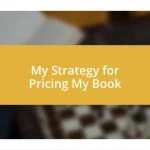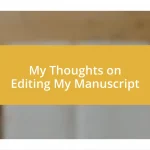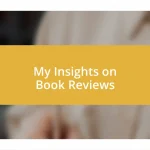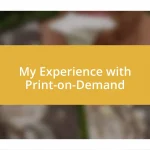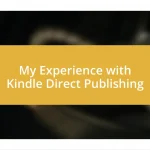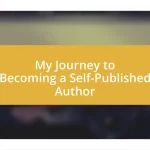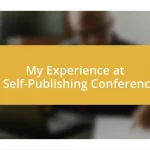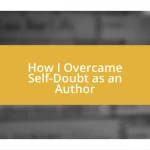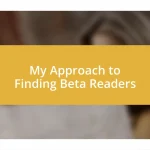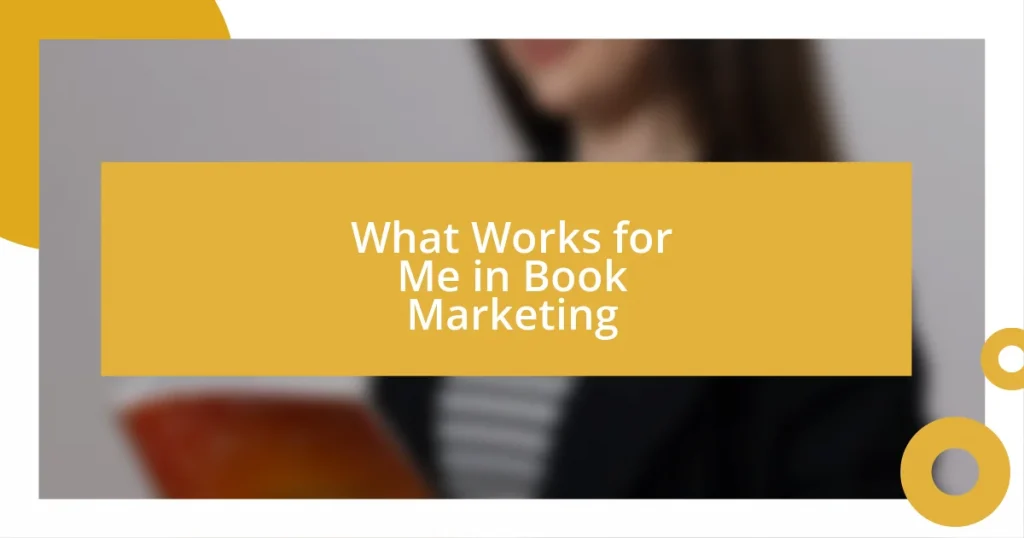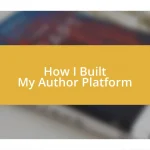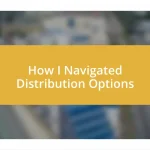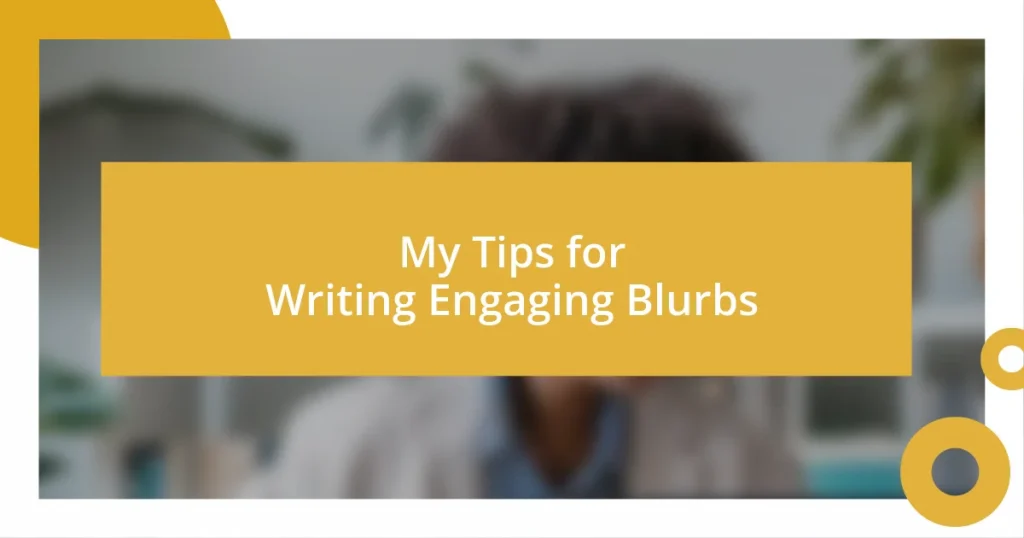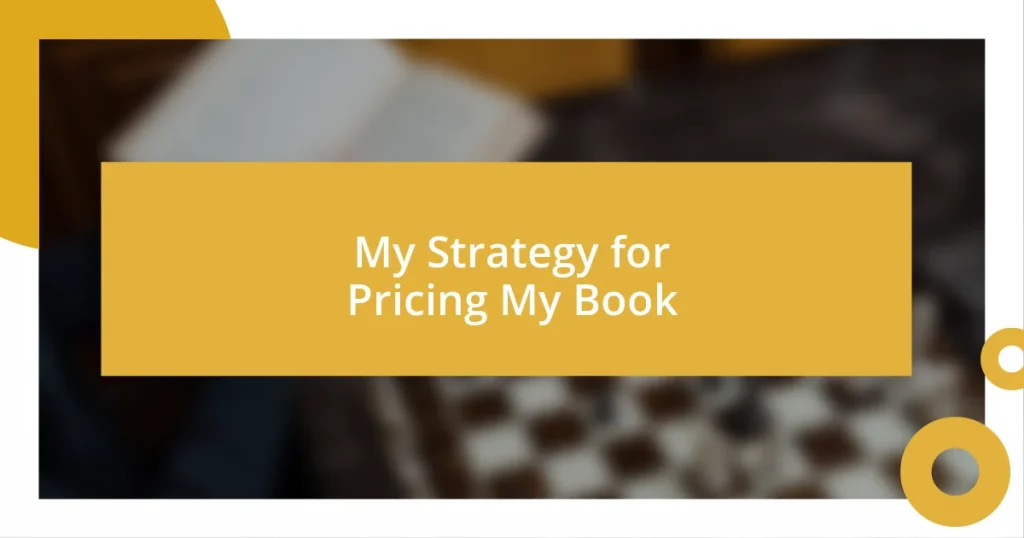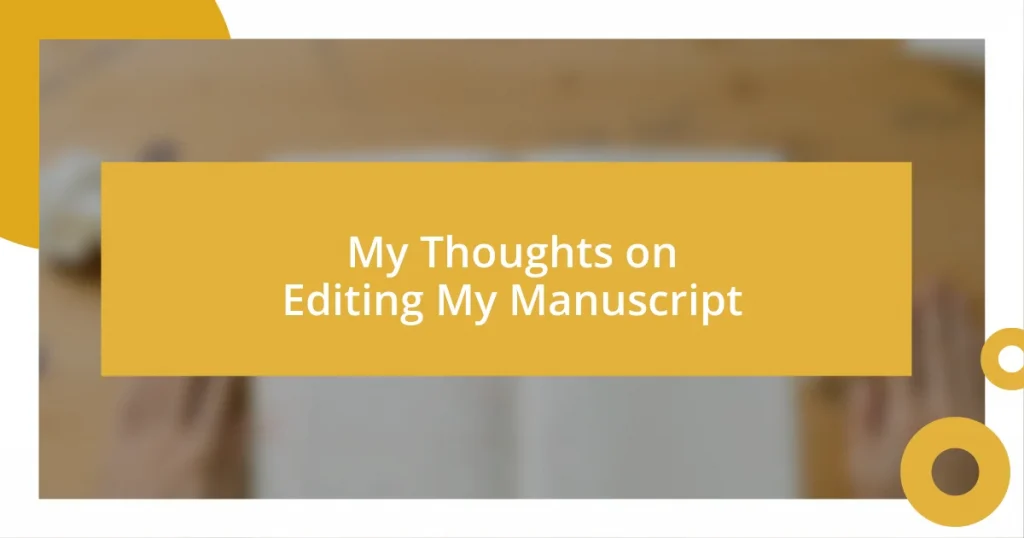Key takeaways:
- Effective book marketing requires understanding and targeting the right audience through social media, email marketing, and community engagement.
- Building authentic connections with readers via personal interactions and sharing creative processes can enhance loyalty and cultivate a vibrant author platform.
- Collaborating with other authors allows for expanded reach and richer experiences for audiences, fostering community discussions and innovation in marketing strategies.
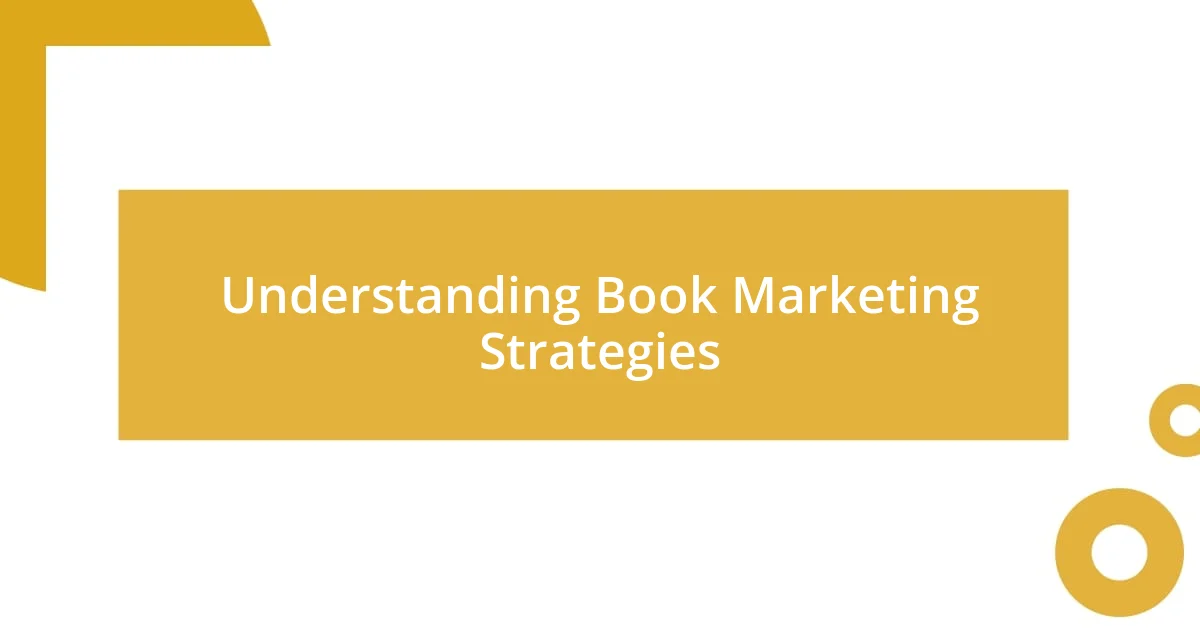
Understanding Book Marketing Strategies
When I first dove into book marketing, I felt like I was standing in front of a maze without a map. My initial strategy was focused heavily on social media, but I quickly learned that it’s about finding the right platforms where my potential readers actually spend their time. Have you ever posted content and wondered why it didn’t resonate? It stings to see a beautiful post fall flat, but it taught me the importance of targeting my audience effectively.
One key aspect that often gets overlooked is the power of email marketing. I remember the thrill when I sent my first newsletter and watched my readership grow! It felt like the words jumped off the page and directly into my reader’s inbox, establishing a more personal connection. Have you ever thought about how an email can make readers feel special and directly involved in your journey? That’s something I cherish in my marketing toolkit.
I can’t emphasize enough the significance of building a community around your work. Early on, I hesitated to engage fully, thinking it would be a waste of time. But when I finally opened up on forums and social media groups, I discovered a treasure trove of support and ideas. It felt incredible to see others share in my excitement and passion for storytelling—how often do we, as writers, get to share our inner worlds with like-minded souls? Engaging with the community can often spark inspiration and foster a loyal readership that feels like family.
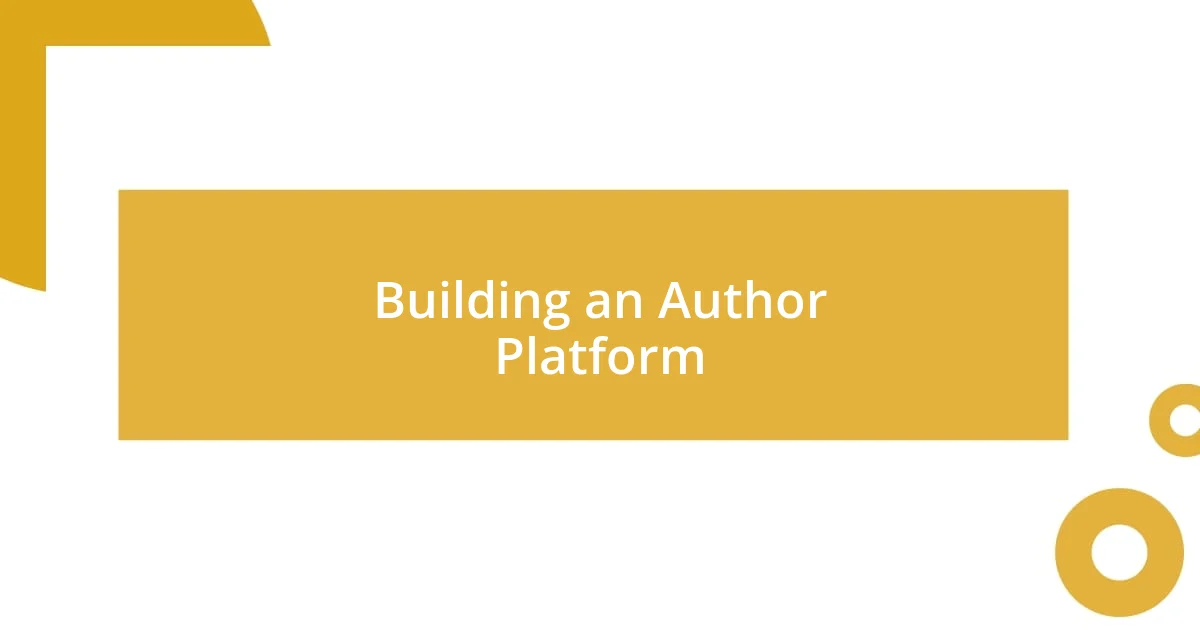
Building an Author Platform
Building an author platform is crucial for any aspiring writer. In my experience, creating an online presence is not just about having a website or being active on social media; it’s about authentically connecting with my audience. I recall the time when I shared a behind-the-scenes glimpse of my writing process on Instagram. The response blew me away! Readers were eager to know more about my book, and it felt like I was letting them into my creative world.
Social media can be a double-edged sword, but when approached thoughtfully, it becomes an invaluable tool. I remember feeling overwhelmed by various platforms and wondering where to focus my energy. Then I realized that interacting in niche groups on Facebook provided a sense of belonging, leading to deep connections with potential readers. Have you ever felt that spark of excitement when someone appreciates your work? That’s what fueling my author platform has been for me—building relationships that turn into loyalty and support.
In addition to these online connections, I have found that hosting virtual events, like book readings or Q&A sessions, can significantly impact my author platform. One time, I organized a themed reading night and invited my followers to join. The conversations that arose were insightful and deeply personal. It amazed me to realize that these events nurtured connections, creating advocates who genuinely believe in my work. Have you considered how engaging directly with your audience could change the dynamic of your relationship with them?
| Platform Type | Purpose |
|---|---|
| Social Media | Engagement and visibility |
| Email Marketing | Direct communication and relationship-building |
| Virtual Events | Community building and audience connection |
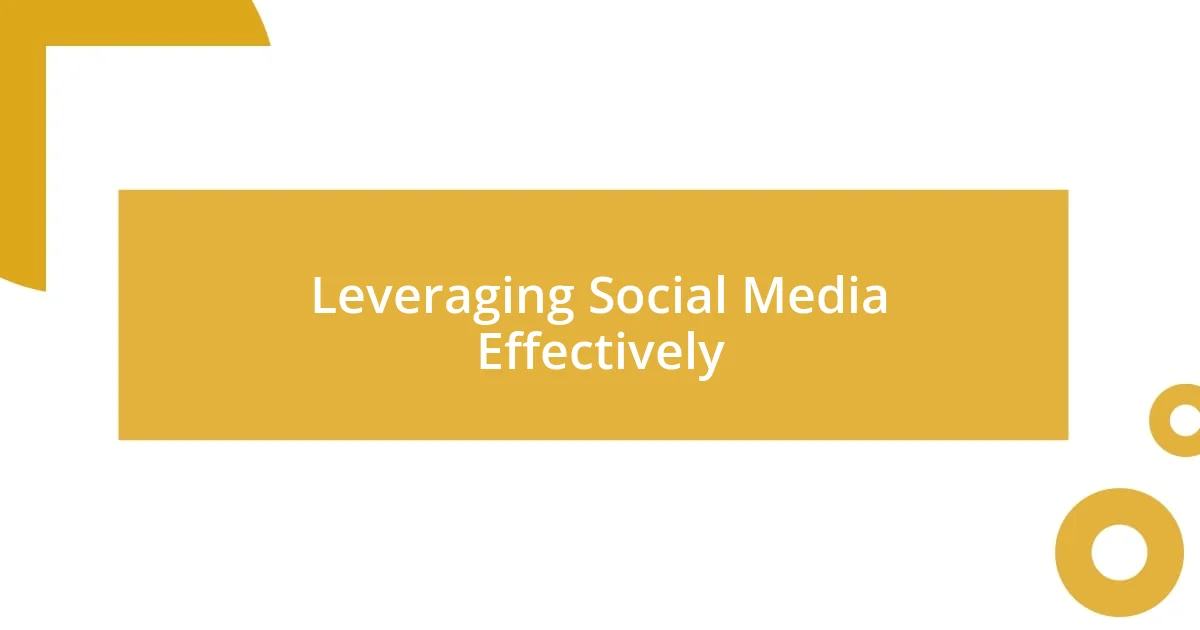
Leveraging Social Media Effectively
Social media can feel like a wild ride, but I’ve found that it’s all about strategy. There was a time when I would post whatever came to mind, only to be met with silence. I quickly realized that engaging with my audience through polls, questions, and personal stories creates a dialogue. People appreciate authenticity, and sharing glimpses into my life not only makes me relatable but also invites readers to be part of my journey. Think about it: when do we connect most? It’s those moments of vulnerability that stick.
For someone navigating the often turbulent waters of book marketing, here are some practical tips I’ve learned along the way:
- Choose your platforms wisely: Focus on 1-2 where your target readers hang out.
- Create engaging content: Use visuals and behind-the-scenes snippets to tell your story.
- Interact consistently: Respond to comments and messages to build relationships.
- Utilize stories: Share daily or weekly updates to keep your audience engaged and invested.
- Encourage sharing: Make it easy for followers to share your content, widening your reach.
Each of these strategies has helped cultivate an enthusiastic community around my writing, and I genuinely enjoy the connections that flourish from it.
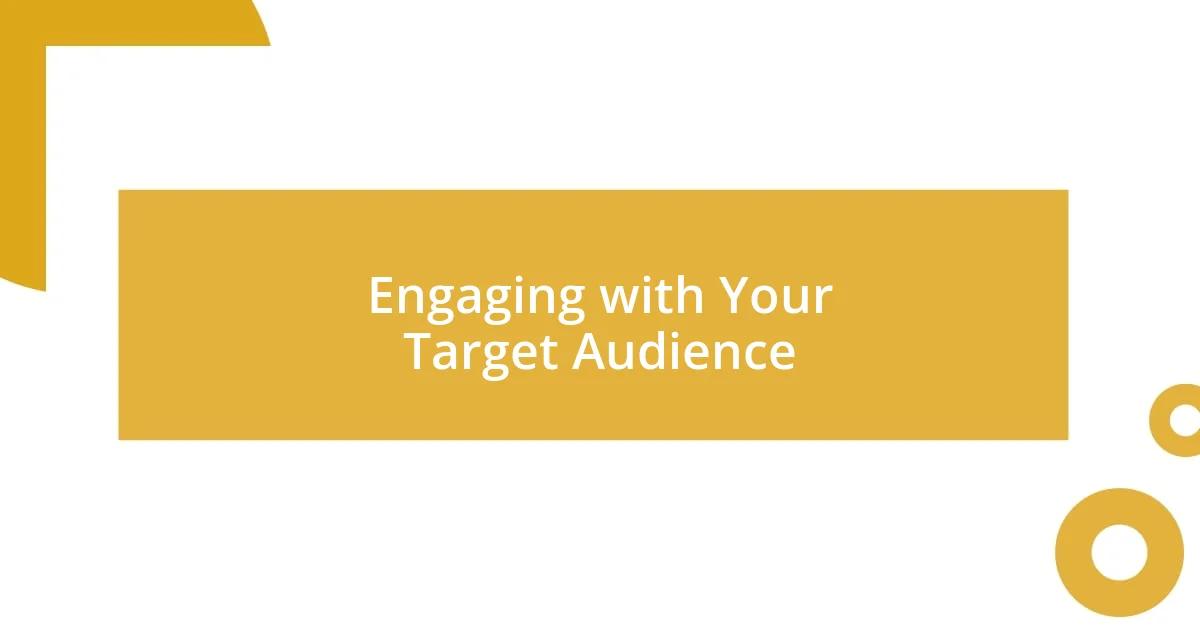
Engaging with Your Target Audience
Engaging with my target audience is an art that requires genuine involvement. I recall a time when I asked my readers to share their favorite characters from my book on a social media post. The flood of responses not only surprised me but also revealed how deeply they connected with the story. It felt like a vibrant discussion around the dinner table, where everyone’s thoughts added layers to the conversation. What surprised me most was the sense of community that blossomed simply from inviting them to share their opinions.
As I’ve engaged more with my audience, I’ve learned the power of listening. One day, someone commented on my post, sharing how a particular chapter resonated with their life experience. That moment was eye-opening for me! It reminded me that readers don’t just consume content; they seek connection. How often do we reflect on what our audience needs? By actively listening—whether through comments, messages, or emails—we can tailor our interactions in a way that makes readers feel valued.
Creating authentic engagement often means stepping out of my comfort zone. I once hosted a live video chat and candidly discussed my struggles with writing. The feedback was overwhelming; people appreciated my honesty and began to share their own challenges. This vulnerability bridged gaps and fostered trust. Isn’t it interesting how sharing our imperfections can create stronger bonds with our audience?
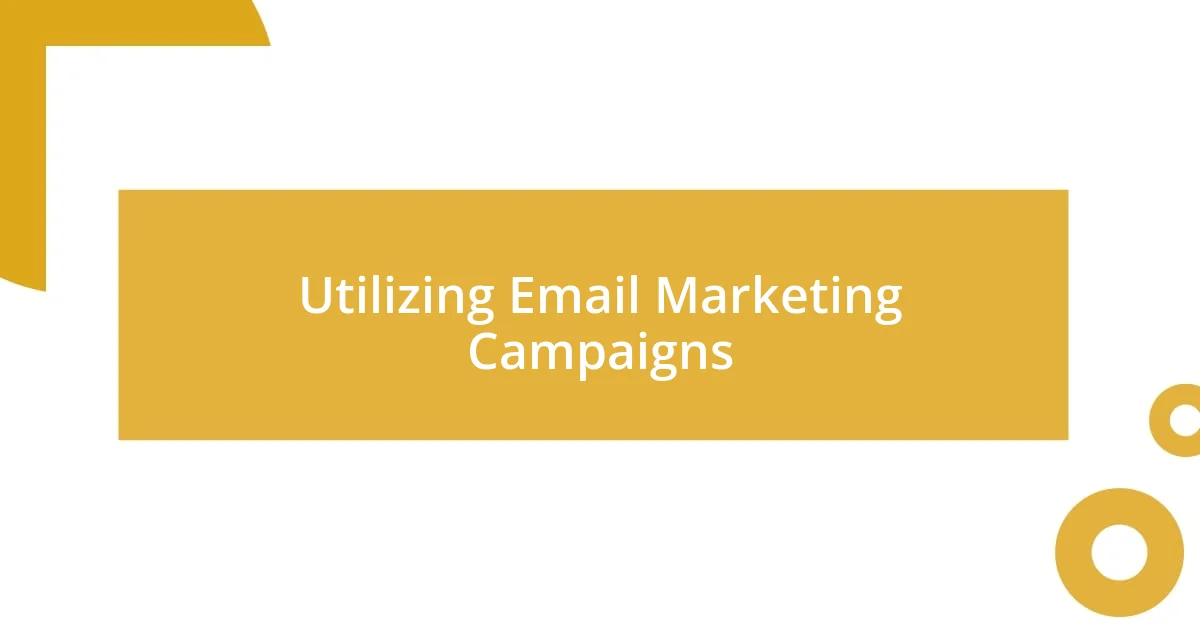
Utilizing Email Marketing Campaigns

Utilizing Email Marketing Campaigns
When I first dipped my toes into email marketing, I was surprised at how direct and personal it felt. I remember crafting my first newsletter, filled with tips about my writing process and sneak peeks of upcoming chapters. It was like sitting down for coffee with a friend, sharing both my literary journey and the little victories along the way. Have you ever considered how an email feels different from a social media post? In my experience, that intimate connection often leads to deeper engagement.
As I honed my approach, I discovered the power of segmenting my audience. I tailored my messages based on readers’ interests and preferences, which made my emails feel more relevant. There was a particularly great response when I sent a special edition email about writing prompts for aspiring authors. Readers not only opened that email but also replied with their own attempts, fostering an inspiring exchange. It made me think—what resonates with your audience?
Now, I’ve integrated personal anecdotes into my campaigns, sharing stories that correlate with the themes of my books. The response is often heartwarming; readers tell me how my experiences validate their own. One memorable reply was from a reader who shared how my struggles with self-doubt in writing mirrored their own journey in pursuing dreams. Isn’t it amazing how email can create a space for meaningful dialogue? This connection has transformed my email list from a simple marketing tool into a vibrant community. Each email becomes a bridge, inviting readers not just to be part of my story but to share theirs too.
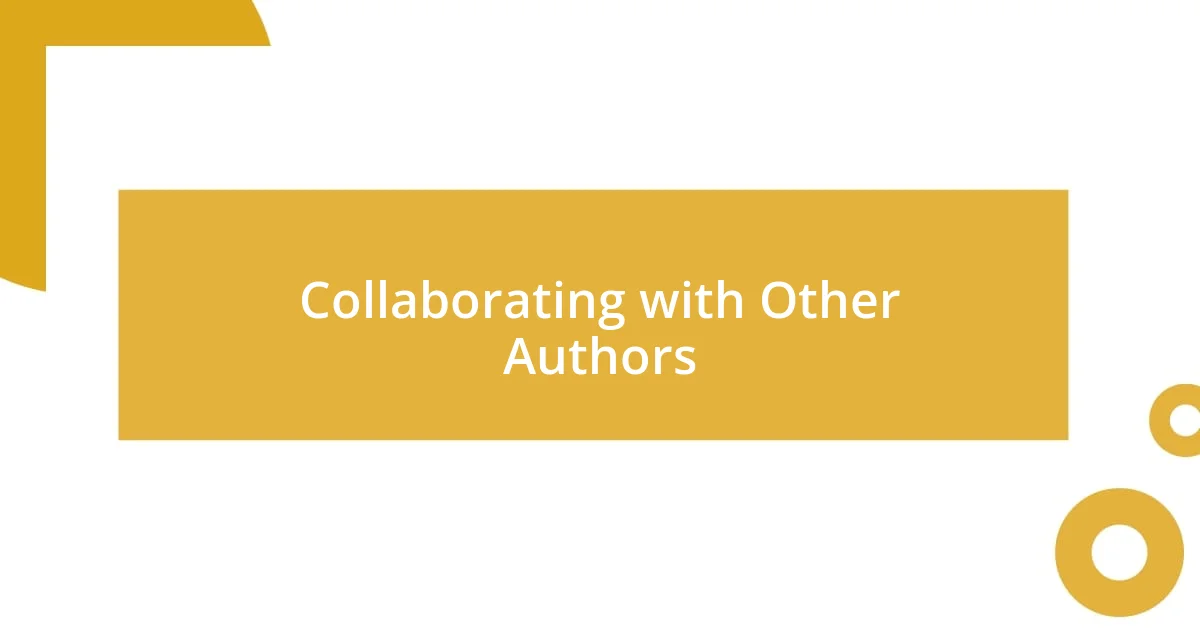
Collaborating with Other Authors
Collaborating with other authors has been a game-changer for me. I remember my first joint event with another writer; we both focused on different genres but shared themes of resilience. When we announced the collaboration, the excitement was palpable. By pooling our audiences, we not only expanded our reach but also created a richer experience for our readers, who enjoyed seeing the unique perspectives we both brought to the table. Have you ever thought about how powerful it is to unite forces with someone else in your field?
Another memorable moment was when I co-wrote a blog series with a fellow author. Each post was a dialogue, weaving our voices together while exploring similar topics. The engagement was incredible! Readers loved the interplay and began to share their own thoughts, turning our writing into a community discussion. The synergy between us not only boosted our individual visibility but also nurtured a collaborative spirit within our audiences. It made me wonder: what other opportunities lie in sharing our creative journeys with peers?
I’ve also found that specializing in different areas can enhance collaboration. For instance, I teamed up with an author who excelled in marketing strategies, while I focused on storytelling techniques. Our combined knowledge created a comprehensive resource that our readers found invaluable. Sharing expertise like this fosters a sense of trust and community. Isn’t it fascinating how collaboration can ignite new ideas and elevate our creative efforts? Each partnership brings fresh energy, revealing depths of creativity we might not explore alone.

